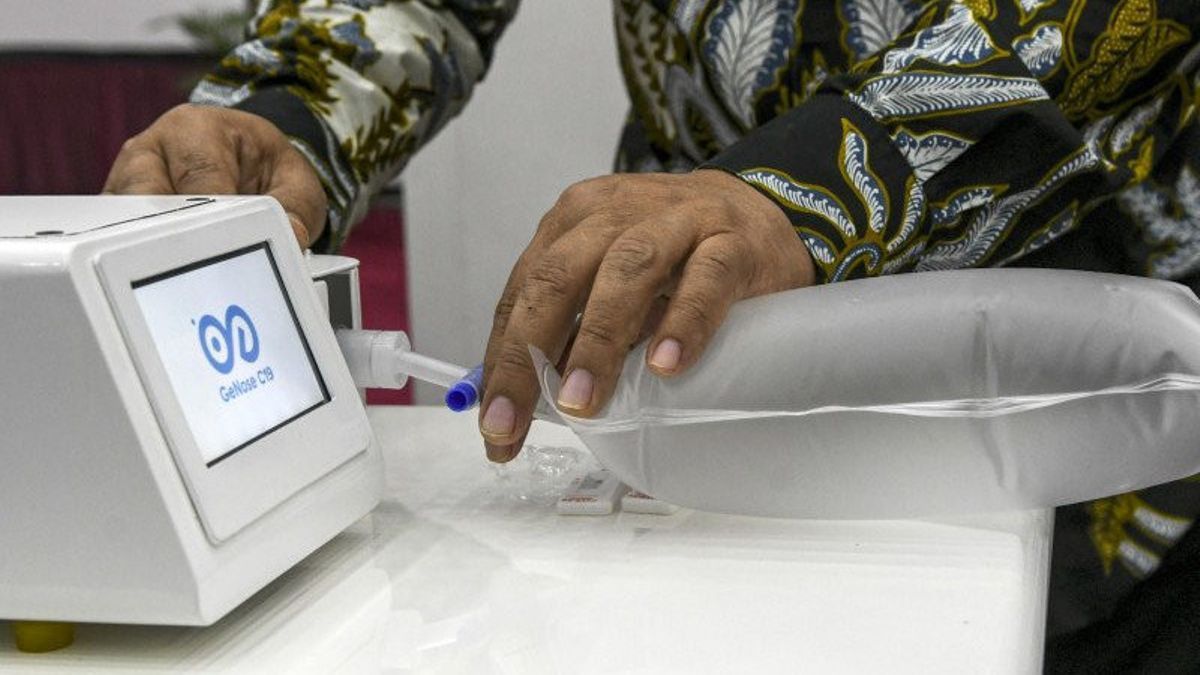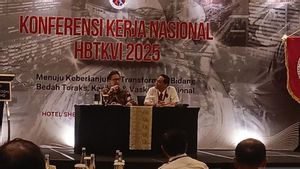JAKARTA - A screening tool for COVID-19 through a breath made by Gadjah Mada University (UGM), GeNose recently obtained a distribution permit from the Ministry of Health and is ready to be circulated next month. The presence of GeNose is considered as the starting point for Indonesia to realize the independence of national medical devices.
The success of Gadjah Mada University (UGM) researchers in developing GeNose C19 is a matter of pride. The reason is, GeNose C19 is the first innovation in Indonesia for the detection of COVID-19 through a breath. GeNose C19 is connected to a cloud computing system through an artificial intelligence-based application to get real-time diagnosis results.
Deputy Minister of Health, Dante Saksono assessed that GeNose is an example of innovation for the nation's children who contribute to realizing the independence of national medical devices (medical equipment).
"GeNose C19 is proof of the nation's independence that we are doing new things in innovation (medical devices)," he said, in a webinar, Friday, January 15.
Furthermore, Dante said, the government supports the development of medical equipment innovations for Indonesian researchers. However, development needs to pay attention to validation tests such as sensitivity, specificity, positive predictive value, and negative predictive value.
"The GeNose validation test needs to be improved. The sensitivity and specificity of GeNose is more than 90 percent but in the future, the validity test must always be studied further," said Dante.
Help Indonesia Get Out of Import DependenceMenristek / Brin Bambang Brodjonegoro, appreciated the presence of GeNose, a tool for screening for COVID-19 through breaths. Bambang believes that this tool can be a solution in reducing Indonesia's dependence on imported Polymerase Chain Reaction (PCR) for COVID-19 testing.
"For us, GeNose is an innovation to reduce screening tools originating from abroad," he said, in a webinar, Friday, January 15.
The government, said Bambang, at the beginning of the pandemic brought in many COVID-19 screening tools from various countries. But, without clear standards. Thus, errors appear during field testing due to the inaccuracy of the tests being performed.
Furthermore, Bambang said, the presence of GeNose was a breakthrough to detect viruses in the community. This is because the screening carried out by the tool is not based on antibodies or antigens but on a volatile organic compound (VOC). These compounds can be used to distinguish people who are infected or not.
"We really welcome GeNose because apart from being part of the Covid-19 Research and Innovation Consortium, it is also a form of synergy between the government, researchers and the business world," he explained.
Bambang hopes that GeNose can continue to improve its accuracy. Because, it really determines the process of tracking, tracing, testing and treatment of handling COVID-19 in the country, as well as the success of the movement of the national economy.
"In terms of research, of course, it must always be updated. Moreover, machine learning is used, which means that the level of accuracy will be better if improvements are made to the software or by using more data which is the input of the machine," he said.
Furthermore, Bambang advised not to be complacent with the current version of GeNose C19. According to him, the GeNose C19 must continue to be updated so that the accuracy is better. "Make sure the GeNose C19 must be really useful and beneficial in society," he said.
Priced at IDR 62 million per unitChairman of the Consortium for Research and Innovation for COVID-19 Research and Technology / National Agency for Research and Technology Ali Ghufron Mukti said the rapid screening tool for COVID-19 through exhalation, the products made by the nation's children GeNose will be sold for around IDR 60 million.
"How much is the selling price for this tool? This is Rp.62 million for the tool," he said, in a webinar, Friday, January 15.
Meanwhile, Head of Production for the GeNose C19 Consortium Eko Fajar Prasetyo said the COVID-19 test kit will be released next month or February to be precise. This is in line with the issuance of a distribution permit from the Ministry of Health.
"For the February target, we are now calculating. We are targeting 3,000 February releases Insyaallah," said Eko.
On the same occasion, the Minister of Research and Technology / National Research and Innovation Agency Bambang Brodjonegoro revealed that the innovative COVID-19 test kits from the nation's children were flooded with orders.
Bambang said, the orders that have been received even exceed the production capacity. For that, he asked the industries involved in GeNose production to increase production capacity.
"From the industrial side, please ensure that besides we can fulfill orders that have come, which I know is far from the current production capacity. However, we hope that the production capacity can catch up soon," said Bambang.
Please note, GeNose is a rapid screening tool made by the nation's children whose tests are different from the antigen or swab tests. Exhale-based GeNose tests.
Later, the patient's breath sample will be taken using GeNose, if the result is positive, it must still be validated using the standard PCR test swab test.
GeNose C19 has also obtained a distribution permit from the Ministry of Health with No. KEMENKES RI AKD 20401022883 on December 24, 2020. This tool will later be used to assist the government in handling COVID-19 through rapid detection.
The English, Chinese, Japanese, Arabic, and French versions are automatically generated by the AI. So there may still be inaccuracies in translating, please always see Indonesian as our main language. (system supported by DigitalSiber.id)









